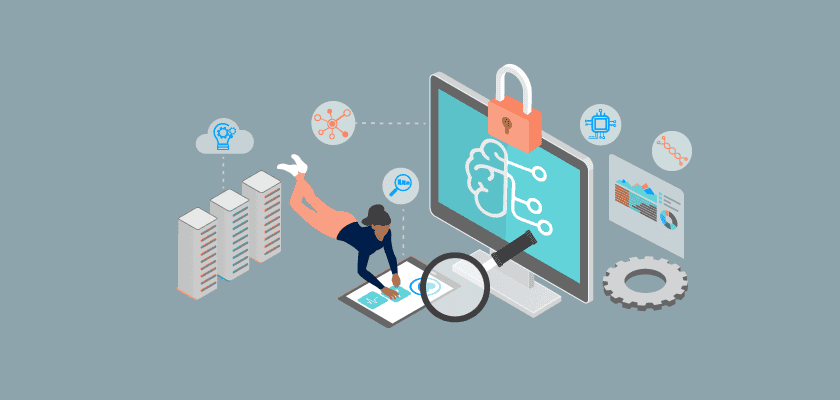Discover the pivotal alliance between AI and data protection, addressing escalating concerns around privacy and security in the rapidly growing AI market. Uncover real-world examples of AI privacy issues, ethical considerations, legal frameworks, and best practices for harmonious integration, ensuring a secure and trustworthy digital future.
The relationship between Artificial Intelligence (AI) and data protection is symbiotic in nature. This relationship is taking center stage in our dynamic digital landscape.
There has been an unprecedented surge in AI applications. The worldwide AI market is expected to rise at a compound annual growth rate (CAGR) of 37.3% from 2023 to 2030. It is creating new job opportunities as well. Therefore, it is crucial to address the escalating concerns surrounding privacy and security.
In this article, I will tell you how AI and data protection can work together. We will navigate the landscape of AI’s ascendancy and underscore the pivotal role of integrating AI with robust data protection measures.
It is not merely a technological alliance but a strategic imperative for future-proofing security in a world where data integrity and privacy are pillars of trust in the digital realm.
Understanding AI privacy issues
In delving into the intricate realm of AI privacy issues, real-world examples vividly illuminate the challenges. AI mishandling sensitive data is alarmingly prevalent, underscoring the urgency of a comprehensive understanding.
Take, for instance, the notorious case where a facial recognition system misidentified individuals, leading to unwarranted consequences. This is a stark reminder of the potential fallout when AI missteps in managing delicate information.
Furthermore, exploring the impact of AI-driven privacy breaches reveals a landscape wrought with consequences. The repercussions are far-reaching, from unauthorised access to personal records to exploiting machine learning vulnerabilities.
These tangible AI privacy issues examples underscore the critical need for robust safeguards, ethical considerations, and proactive measures to mitigate risks in our increasingly AI-driven world.
Navigating AI Data Protection Issues
Exploring the world of AI data protection issues feels like safeguarding a treasure chest, with AI as the guardian. While Artificial Intelligence brings benefits, it’s not foolproof—vulnerabilities and biases can be exploited. Think of it as fortifying digital fortress walls to address these challenges.
AI, unlike traditional security, is dynamic. It learns and evolves, posing unique challenges for data protection. Picture securing a shape-shifting puzzle; our strategies must adapt as AI changes. Understanding AI’s distinct features is critical to creating safeguards that keep up with its ever-evolving nature.
Navigating AI data protection issues is an ongoing adventure. We must be vigilant, addressing vulnerabilities and tailoring security measures to ensure our digital treasures remain secure in this fast-paced era. It’s about staying one step ahead in the dynamic world of AI data protection issues.
Ethical considerations in AI privacy
In delving into the ethical dimensions of AI privacy, it becomes evident that technological innovation and ethical practices must strike a delicate balance.
One essential facet is the demand for transparency and accountability within AI algorithms. As an individual navigating the digital landscape, it’s crucial to understand how AI systems handle and process our data. Transparency ensures that AI operations are not veiled in complexity, fostering trust between users and technology.
Moreover, the challenge lies in harmonizing innovation with ethical privacy practices. In the race for technological advancement, it’s imperative to uphold ethical standards, safeguarding user privacy and dignity. AI should serve humanity while respecting fundamental rights.
This involves designing algorithms that prioritize privacy and avoid unintended consequences. Striking this balance is pivotal to ensuring that Artificial Intelligence doesn’t compromise the privacy it aims to protect. As we progress, embracing an ethical framework becomes paramount, guiding AI development towards responsible, user-centric practices in AI privacy ethics.
The interplay of AI, privacy, and security
The intertwining dance of AI, privacy, and security in technology is a complex yet crucial symphony. AI plays a critical role in cybersecurity as well. As an AI enthusiast, witnessing how AI contributes to beefing up our digital fortresses is fascinating.
AI’s ability to swiftly analyse vast datasets enables the identification of potential threats, acting as a vigilant guardian. This proactive stance enhances security measures by predicting and preventing breaches before they unfold.
However, navigating the delicate balance between security and privacy is akin to walking a tightrope. While AI bolsters security, there are intricate challenges in preserving user privacy.
As I delve into this complex landscape, it’s evident that the very mechanisms enhancing security can inadvertently encroach on personal privacy. Striking the right chord is essential, ensuring robust security protocols without compromising the individual’s right to privacy.
Finding harmony is an ongoing journey in the realm of AI privacy and security. It involves constant refinement of algorithms, meticulous scrutiny of data handling, and a commitment to transparency.
As we embrace the benefits of Artificial Intelligence in fortifying our digital defenses, it’s imperative to tread carefully, respecting the fine line between safeguarding against threats and upholding the sanctity of personal privacy.
Legal framework: AI privacy laws
AI privacy laws are pivotal in safeguarding user information and ensuring ethical AI practices. Let’s look at the legal framework governing AI and privacy.
AI privacy laws vary globally, reflecting diverse perspectives on regulating technology for user protection. Governments and regulatory bodies increasingly recognize the need to establish guidelines that balance innovation with privacy concerns.
These regulations aim to set clear boundaries for Artificial Intelligence systems, from the General Data Protection Regulation (GDPR) in Europe to evolving laws in the United States and beyond.
Navigating the intricate landscape of AI privacy laws poses business challenges and opportunities. Compliance is a legal obligation and a cornerstone for building trust with users. Understanding and adapting to these laws might seem complex.
However, it opens doors for innovation while ensuring responsible and ethical AI use. Businesses that successfully navigate these compliance challenges avoid legal pitfalls and position themselves as stewards of user privacy, fostering a positive reputation in the market.
As we delve into the legal aspects, it becomes evident that embracing AI privacy laws is not just about meeting regulations; it’s a strategic move toward a more trustworthy and sustainable digital future.
Privacy concerns in healthcare AI
When we look at the world of healthcare AI, we encounter paramount concerns revolving around patient privacy. Securing patient data is like safeguarding a treasure trove; the stakes couldn’t be higher. Privacy concerns with AI in healthcare extend beyond traditional confidentiality norms, requiring a delicate balance between innovation and ethical responsibility.
Firstly, the heartbeat of these concerns lies in ensuring patient data security and confidentiality. Imagine your personal medical history, intricately woven with vulnerabilities and triumphs, being handled by algorithms. The challenge is to let AI unravel the complexities without compromising the sanctity of this data.
Moreover, ethical considerations loom large over healthcare AI applications. It’s not just about what the technology can do; it’s about what it should do. As we navigate the intricate web of healthcare ethics, questions arise about the responsible use of AI.
Privacy concerns with AI in healthcare demand a thoughtful approach, where each advancement is weighed against the impact on individuals and society. Balancing progress with protecting personal health information is not just a legal obligation; it’s a moral imperative as we shape the future of healthcare.
Best practices for AI and data protection integration
In our quest to create a secure future where AI and data protection coexist harmoniously, adopting best practices that integrate advanced technologies with robust privacy measures is crucial. Here are some strategies to ensure this integration:
Implementing privacy-enhancing technologies in AI systems
As we delve into the intricate world of AI, incorporating privacy-enhancing technologies becomes paramount. This involves leveraging tools and techniques that prioritize user privacy without compromising the efficiency of AI systems.
Encryption and anonymization
Utilise encryption methods to safeguard sensitive data, ensuring that even if intercepted, it remains unreadable. Anonymization techniques can further protect individual identities while still allowing meaningful analysis.
Data minimisation
Embrace the principle of data minimization, where only essential information is collected and processed. This reduces the risk of privacy breaches and aligns with ethical data practices.
User consent mechanisms
Implement transparent and user-friendly consent mechanisms, empowering individuals to control how their data is utilized. This fosters a sense of trust and ensures compliance with privacy regulations.
Ensuring compliance with AI privacy laws and ethical standards
Navigating the complex landscape of AI privacy laws and ethical standards is essential for responsible and lawful AI deployment.
Regular audits and assessments
Conduct periodic audits and assessments to ensure ongoing compliance with evolving privacy regulations. This proactive approach allows for adjustments to be made in real-time, minimizing legal risks.
Ethical AI training for developers
Provide comprehensive training for AI developers on ethical considerations in AI design and implementation. This promotes responsible AI practices and fosters a culture of ethical awareness within the development community.
Transparency in AI decision-making
Strive for transparency in AI decision-making processes. Communicate how AI systems operate, enabling users to understand the rationale behind decisions and fostering trust in AI applications.
FAQs
How can AI help in data protection?
AI enhances data protection by swiftly analyzing vast datasets, identifying potential threats, and acting as a vigilant guardian. Its proactive stance enables the prediction and prevention of breaches, contributing to robust security measures. Encryption, anonymization, and user consent mechanisms are implemented to prioritize privacy without compromising efficiency.
How does AI and data work together?
AI and data are symbiotic and essential in our dynamic digital landscape. Artificial Intelligence processes and learns from data, contributing to unprecedented growth in AI applications. The integration involves navigating privacy issues, fortifying data protection, and addressing ethical considerations. It’s a strategic imperative, future-proofing security in a world where data integrity and privacy are pillars of trust.
What is the role of AI in data security?
AI plays a crucial role in data security by swiftly analyzing vast datasets to identify and prevent potential threats. It acts as a vigilant guardian, enhancing security measures by predicting and preventing breaches. However, balancing security and privacy is complex, requiring constant refinement of algorithms, meticulous data handling, and a commitment to transparency.
How do developments in AI intersect with data security?
Developments in AI intersect with data security through ongoing efforts to strike a balance between enhancing digital defences and upholding personal privacy. AI’s dynamic nature poses challenges, requiring constant adaptation of strategies. AI, privacy, and security intertwining dance involve refining algorithms, scrutinizing data handling, and a commitment to transparency for a trustworthy and sustainable digital future.
Final Remarks
In navigating the evolving landscape of AI and data protection, it’s clear that their symbiotic relationship is pivotal for a secure digital future. Addressing privacy concerns becomes imperative as we witness the surge in AI applications.
From AI mishandling sensitive data to the intricacies of healthcare AI, the delicate balance between innovation and ethical responsibility is evident. Embracing best practices, such as privacy-enhancing technologies and transparent AI decision-making, is paramount.
It’s a continuous journey of refinement, compliance with evolving laws, and ethical considerations—ultimately shaping a trustworthy and sustainable digital era where AI safeguards our digital fortresses without compromising privacy.













